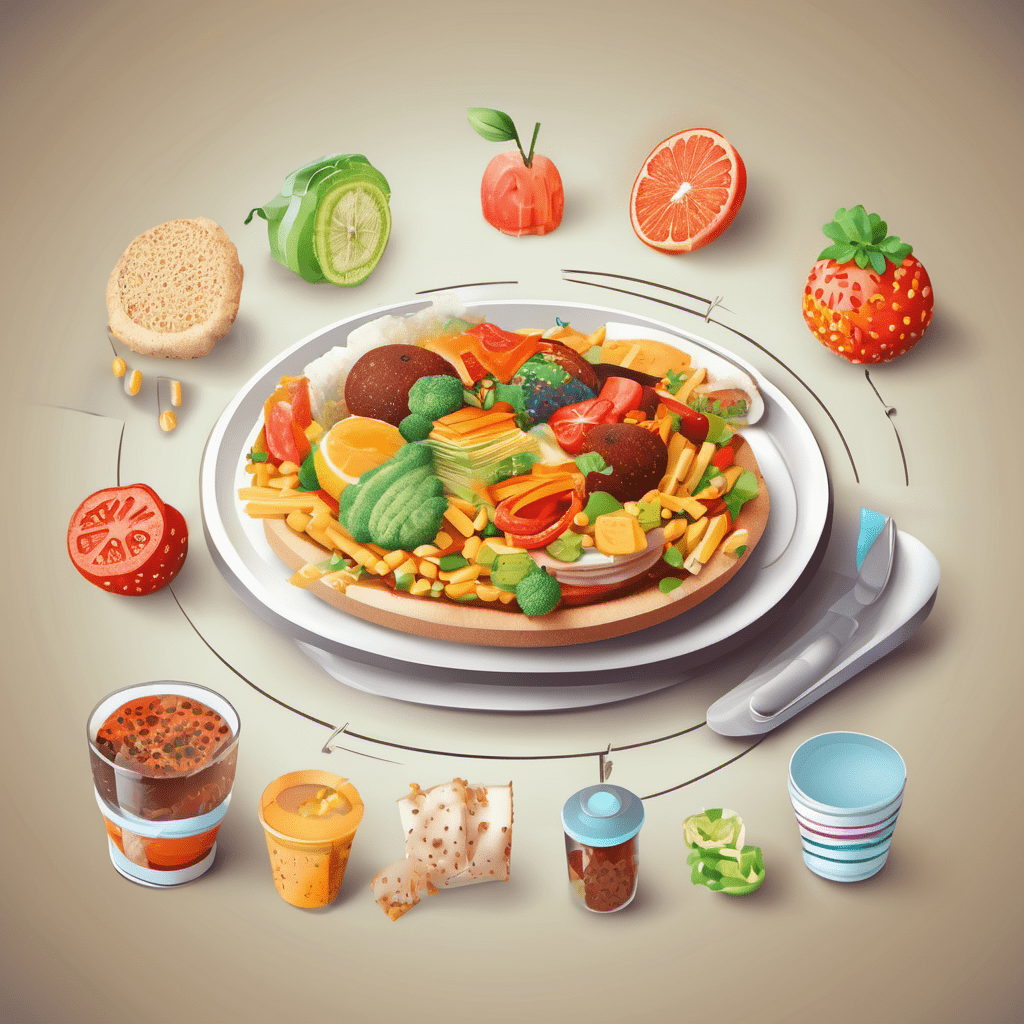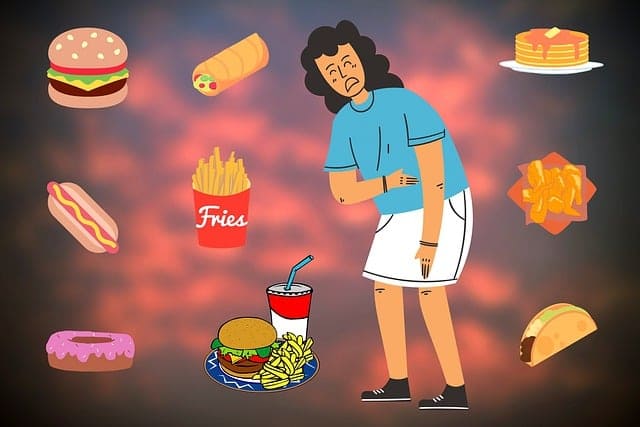The process of digestion is complex and essential for nutrient absorption, energy production, and overall well-being. When food is not digested properly, various factors can be responsible that affect the complex digestive system. A primary factor is insufficient enzyme production, as enzymes play a vital role in breaking down food into absorbable nutrients. Additionally, poor eating habits, such as haste or inadequate chewing, can interfere with the initial stages of digestion. Some medical conditions, such as gastrointestinal disorders or hormonal imbalances, may also contribute to digestive difficulties. Stress and anxiety can further disrupt the digestive process by triggering the secretion of hormones that affect gut function. Additionally, an imbalance in gut bacteria, known as dysbiosis, can hinder nutrient absorption and cause digestive discomfort. Understanding the multifaceted nature of digestion and identifying the specific causes behind poor digestion is essential to developing effective strategies to promote a healthy digestive system.
In this article, we will explore the various reasons why food may not be digesting properly and offer insights into potential solutions.

- Bad diet choices:
The most common cause of digestive problems is poor diet. Eating excessive amounts of processed foods, high-fat foods, and low-fiber foods can hinder the digestion process. These foods often lack the nutrients and enzymes needed for efficient digestion. To promote better digestion, it is important to maintain a balanced diet rich in fruits, vegetables, whole grains, and low-fat proteins. - Insufficient Enzyme Production:
Enzymes play an important role in breaking down food into smaller, absorbable components. Insufficient production of digestive enzymes can lead to incomplete digestion, leading to bloating, gas, and discomfort. Factors such as age, genetics, and certain medical conditions can affect enzyme production. Supplementing with digestive enzymes or including enzyme-rich foods like pineapple and papaya may help improve digestion. - Stress and Digestion:
Stress has a deep impact on the digestive system. When the body is stressed, it activates the “fight or flight” response, diverting resources away from digestion. This can slow gastric emptying, reduce blood flow to the digestive organs, and increase tension in the digestive muscles. Practicing stress reduction techniques such as meditation, deep breathing or yoga can have a positive effect on digestion. - Dehydration:
Adequate hydration is essential for proper digestion. Water helps break down food, facilitates the absorption of nutrients and aids the flow of waste through the digestive system. Inadequate water intake can cause constipation and hinder the digestion process. It is recommended to drink adequate amounts of water throughout the day to promote optimal digestion. - food intolerance:
Food intolerances occur when the body has difficulty digesting specific components of food. Common intolerances include lactose intolerance, gluten intolerance and fructose malabsorption. Individuals with food intolerances may experience digestive discomfort, bloating and diarrhea. Identifying and avoiding trigger foods is important for managing these conditions. - gastrointestinal disorders:
Various gastrointestinal disorders can disrupt the digestion process. Conditions such as irritable bowel syndrome (IBS), inflammatory bowel disease (IBD), and gastroesophageal reflux disease (GERD) can cause chronic digestive problems. It is essential to seek medical advice and appropriate treatment to manage these conditions and improve digestive health. - Medicines:
Some medications can affect digestion as a side effect. For example, some antibiotics, pain relievers, and antacids can disrupt the balance of gut bacteria or interfere with the production of digestive enzymes. It is important to consult a health care professional if you suspect that your medication is affecting your digestion.

Conclusion:
Finally, the complex process of digestion is subject to a myriad of factors that can hinder its efficiency. The root cause of poor digestion is often a combination of lifestyle choices, physical factors, and underlying medical conditions. Addressing these issues requires a comprehensive approach that includes careful eating habits, adequate nutrient intake and consideration of individual health circumstances. By promoting proper chewing, maintaining a balanced and nutrient-rich diet, and managing stress levels, individuals can contribute to optimizing their digestive function. Additionally, seeking medical guidance to address underlying health conditions and imbalances, such as enzyme deficiencies or dysbiosis, is important for people experiencing persistent digestive challenges. Ultimately, understanding the complex interplay of factors that influence digestion empowers individuals to take proactive measures to enhance their digestive health and overall well-being.
In the quest for better digestive function, it is essential to recognize the interconnectedness of physical and mental well-being. Lifestyle modifications, including regular exercise and stress management techniques, can have a significant impact on digestive processes. Additionally, promoting a positive relationship with food and paying attention to individual dietary needs may contribute to a more harmonious digestive experience. As our understanding of the digestive system continues to evolve, a holistic approach that integrates nutrition, lifestyle choices, and medical interventions will be helpful in addressing the complex range of factors that contribute to poor digestion. By adopting a broader perspective, individuals can create a digestive environment conducive to optimal nutrient absorption and overall health.
List of Easily Digestable Products:
| NO# | Products | describtion | Aproximate Price | Buy Nowww |
| 1 | Orgain Organic Protein Bars | Nutrient-packed protein bars with organic ingredients, perfect for a quick and healthy on-the-go snack. | $19.99 (12-pack) | Buy Now |
| 2 | Kind Nut Bars Variety Pack | Assorted nut bars with natural ingredients, offering a delicious blend of flavors and a satisfying crunch. | $14.99 (12-pack) | Buy Now |
| 3 | RXBAR Whole Food Protein Bar | Simple and clean protein bars made with whole food ingredients, no added sugars, and great taste. | $18.99 (12-pack) | Buy Now |
| 4 | Bare Baked Crunchy Apple Chips | Crispy apple chips with no added preservatives or sugar, providing a healthy alternative to traditional snacks. | $22.99 (6-pack) | Buy Now |
| 5 | Happy Tot Organic Superfoods Pouches | Convenient organic baby food pouches filled with a blend of fruits, vegetables, and superfoods for growing tots. | $24.99 (16-pack) | Buy Now |
| 6 | Nature’s Bakery Fig Bars | Soft, whole grain fig bars made with real fruit, perfect for a wholesome and tasty snack any time of the day. | $14.99 (12-pack) | Buy Now |
| 7 | Quaker Instant Oatmeal Variety Pack | Quick and easy oatmeal packets with various flavors, providing a hearty and nutritious breakfast option. | $12.99 (48-count) | Buy Now |
| 8 | GoGo squeeZ Applesauce Pouches | Squeezable applesauce pouches with no added sugars, perfect for a mess-free and tasty on-the-go snack. | $14.99 (20-pack) | Buy Now |
| 9 | Blue Diamond Almonds Variety Pack | Assorted flavored almonds with heart-healthy fats, making for a delicious and nutritious snack. | $19.99 (16-pack) | Buy Now |
| 10 | Annie’s Homegrown Organic Bunny Fruit Snacks | Organic fruit snacks shaped like bunnies, free from artificial colors and flavors, making them a fun and wholesome treat. | $17.99 (24-pack) | Buy Now |
Also Read:
Is Fitness a Sport?
How to Buy Healthy Foods on a Budget
Foods For Heart Health
Healthiest Foods
Burn calories and build muscle with 20 minute workout
Remember, this information is not a substitute for professional medical advice. If you experience persistent digestive issues, always consult your doctor for accurate diagnosis and personalized treatment.
FAQs about Food Not Digesting (Indigestion):
Q: Why is my food not digesting properly?
A: Many factors can contribute, including overeating, greasy/spicy foods, stress, underlying medical conditions, and certain medications.
Q: What are the common symptoms of indigestion?
A: Bloating, gas, heartburn, nausea, abdominal pain, and feeling uncomfortably full are common culprits.
Q: Could it be lactose intolerance?
A: If you experience bloating and discomfort after consuming dairy products, consider trying lactose-free options or discussing lactose intolerance with your doctor.
Q: What about gluten intolerance?
A: If you suspect gluten sensitivity, talk to your doctor for proper diagnosis and dietary guidance.
Q: Could stress be affecting my digestion?
Absolutely! Stress can disrupt your gut’s communication with your brain, leading to digestive issues. Relaxation techniques like deep breathing and meditation can help.
Q: Are there foods I should avoid to improve digestion?
A: Greasy, fried, and processed foods can be hard to digest. Focus on fruits, vegetables, whole grains, and lean protein for a smoother process.
Q: When should I see a doctor?
A: If your symptoms are severe, persistent, or accompanied by fever, blood in stool, or sudden weight loss, seek medical attention.
Q: What tests can diagnose digestive issues?
A: Your doctor may recommend blood tests, stool tests, or imaging studies depending on your specific situation.
Q: Are there medications for indigestion?
A: Over-the-counter antacids can offer temporary relief. However, consult your doctor before taking any medications long-term.
Bonus:
Q: What about probiotics?
A: While research is ongoing, some gut-friendly bacteria in probiotics may aid digestion. Choose reputable brands and discuss their use with your doctor.
Q: How can I maintain healthy digestion overall?
A: Focus on a balanced diet, stay hydrated, manage stress, exercise regularly, and get enough sleep. These steps can optimize your gut health and keep digestion working smoothly.



